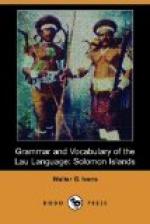daro 2. pers. pron. dual 3. suffixed to verbs and prepositions as object, or to prep, as an anticipatory object, the two of them.
darongai v. tr., to scatter, cause to disperse. S. daro’i
dasa n., fog, mist.
dau, dadau v. i., to hold, catch, take, touch; used with poss.; dau agu, touch me; dau toogu, meet me. S. dau. 1.
daula v. n., holding, touching.
dedengi v. tr., to pour out. S. dede’i.
dee, deedee v. tr., to catch fish; mwane deedee, a fisherman.
deela v. n., dee ana deela, to fish.
didi v. tr., to carve, to grave. S. didi 2.
diena adj., good, proper, accurate, beloved; lio diena fafi, to delight in, to love.
dienala v. n. U. diena.
dila v. i., to jump down. S. dile.
dingalu; dui dingalu, completely finished.
dodoria adj., clear, open, of path.
dole v. i., to delay, to be a long time.
dolofi v. tr., to rub in the hands.
donga v. i., to spread, to circulate.
dongaa adj., consecutive. S. donga 2.
doo n., thing; the noun ending may be added; with the personal article, a doo, the person, so-and-so, such an one; ni doo ne, the woman, woman (Voc.); doo mamana, truly; ade doo, to worship; dooa, doola v. n., saitama dooa, wisdom; ade doola, worship; cf. S. ola.
dori v. tr., to wish for, desire, love.
dudu v. i., to move position; dudu mai, come hither; dudu oli, to retire. U. dudu.
dumuli v. tr., to lay hold of.
duqe v. tr., to split, burst, wound; too duqe, to cause to burst open; ofu duqe, to burst.
duu v. tr., to visit upon, punish, repay, qaiduu, to revenge.
duulana, with loc. i, i duulana, because of.
duula v. n., recompense.
E
e. 1. used to make a construct form, added to the first of two nouns, fuli abae ai, man’s handiwork; toloe fera, a hill; when the first noun ends in a, ae is contracted into e, aqale mwae, ten bags; fufue ai, seed; when the first noun ends in o, the oe is contracted into e; abolo, piece, abole ai, log. Cf. Mota, construct form of nouns, where the ending of the first noun may be altered to e.
e. 2. pers. pron. sing. 3. he, she, it, used to precede nia when the meaning is, there is, it is: na liqa gera enia ada, they have their holes; ma te ai enia i luma, there is only one person in the house; generally used of the neuter; e langi, no, not; e langi ana, it is lost; e langi o si sulu isulia, you must not follow him; e sui na, it is finished; e uta, how? S. e.




